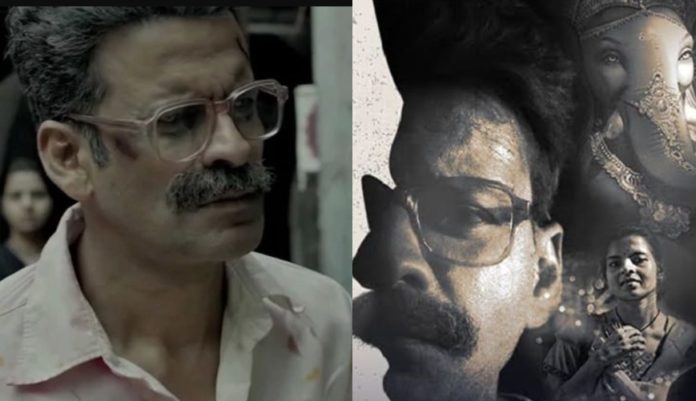Even with few dialogues, Manoj Bajpayee makes ‘Bhonsle’ a treat to watch
Story: Bhonsle is a constable in the Mumbai police. The film begins with his retirement, a quiet, unassertive affair amidst the Ganpati idol for the festival of Ganesh Chaturthi. The crux of the story is ..when a migrant who is from Bihar helps Vajpayee’s bad time then he realizes that we all have equal rights and should be treat equally as marathis are treated.
Ganpath Bhonsle (Manoj Bajpayee) is ending perhaps the most meaningful relationship of his life as the film begins. He is doing it with utmost reservation; but retirement has crept upon this reticent cop. As he takes off his uniform, elsewhere, a sculptor is putting the final touches on a statue of his maker, ahead of Ganesh Chaturthi. The evocative first few minutes set the tone for Bhonsle — a man straining against redundancy in a city where he has been nothing but an observer all his life.
A man who hardly opens his mouth, staying in silence most of the time, in his own world, Manoj has perhaps fewer dialogues in the film, most of them rambling ones– Bhonsle’s relationship with the world outside his dreary ‘kholi’ is tenuous at best. What draws the audience instantly in the film is the strongly picturised dream sequence, where he sees himself growing old and dying while carrying out his monotonous routine – cooking, washing, catching that drip on the roof.
As an audience, the window takes us into his future, as a solitary old man who is disconnected with the world that surrounds and sunk in his own world. The director has captured the scenes of the rickety shack of Bhonsle housed with differing ethnicities and Vilas, including a taxi driver who wants to exploit these for a political career. Right through the film, he attempts to rake up anger within the Marathis against those he considers the others, the Bihari migrants.
Bhonsle is engrossed in his mundane day-to-day life, he simply observes, hardly speaking a word unless necessary. But when a young Bihari woman moves into the shack along with her kid brother and Vilas’ growing desperation leads to increasingly wicked acts.
Watch the trailer of Bhonsle
The most thrilling aspect of the film is the story teller Makhija’s liaisons with cinematic ambition a grounded, bottoms-up approach. The two-hour-long film plays out over the course of the Ganpati festival. The dance sequences plucked from the celebration’s blends in quite well in the narrative.
From a little chawl hidden away in a corner of the megapolis, Makhija launches an ambitious project that takes a lowly policeman for its protagonist and a local guy with political aspirations, Vilas (Santosh Juvekar), who wants the migrants in the chawl to know that it is ‘Maratha manoos first’. The struggle plays out with Ganesh Chaturthi as the backdrop as other chawl residents – Bhonsle included – watch from the sidelines, refusing to be anything more than a face in the crowd.
Bhonsle continues to his endless dreaming under the ever-rising concrete megastructures, and his refusal to be dwarfed by his station, the director finds room for all these. What is exciting is the viewers are drawn into in this near-ritualistic style of living, growing closer and closer to Bhonsle. The ambience is equally absorbing which has tickly voice emanating from a radio, the crow at his window or the half-eaten bread on his plate.
Makhija’s world is grey; there are no heroes or villains here. If Bhonsle’s silence as migrants suffer, like that of his neighbours, is disapproving in the beginning; Vilas is also a victim of his circumstances. He is rebelling against a class system that will not let him step beyond his station, as he lives in the shadows of high-rises.
The weight of his ambition will soon wreak havoc in the lives of the chawl dwellers, with Bhonsle forced to surrender a lifetime of silence. When that dam breaks, the result is both striking and ferocious. Bajpayee – who has given us some deeply affecting portrayals of lonely men in Aligarh and Galli Guleiyan – is again astounding as he becomes Bhonsle. In a deeply internalised performance, he makes every gesture count, and does not need lines to convey Bhonsle’s loneliness. A slight twitch of his lips, those drooping eyes; even the way he stands — the actor uses his entire body — gives us a deeply moving portrait of a man at odds with the world around him.
These sequences comprise the most brilliant filmmaking of this talented director’s career. The long, unbroken shots or sequences that are a Makhija staple are justified and visually rewarding here, fitting well into the larger framework of the film.
Makhija and cinematographer Jigmet Wangchuk ensure that we are the fly on the wall as Bhonsle lives his daily life in the dirty ‘kholi’.
Bhonsle’s life is enriched by Bajpayee’s brilliant performance. The hesitant dialogue, the walls of his patience, the unmitigated ferocity of his wrath keeps the viewing experience seamless.
The movie is a simple plot, and carries it through to its natural end, thus fulfilling Bhonsle’s character, and justifying the story that needs to be told.
It is a honest, truthful film — the fact of living miles away from home and building a life out there; it’s about a manhood deprived of agency, of resignation, of things taking their time before working for you, the whimper of broken dreams, and the silence that cloaks it all in a noisy, noisy city.
Director Devashish Makhija keeps the proceedings dark and disturbing just like his previous film ‘Ajji’ (2019). However, the pace is super slow most of the time and the climax may not appeal to one and all. There was scope to add further dimension to some characters like Vilas’ boss and the reason why he ignores him. On the positive, the anti migrant issue in Mumbai is highlighted effectively without taking sides.
In this movie, we will see how migrants are exploited by Marathi folks in Mumbai chawls. Similarly, Manoj Vajpayee being a Marathi, he fights against his own Marathi community who exploits migrants. when a migrant who is from Bihar helps Vajpayee’s bad time then he realizes that we all have equal rights and should be treat equally as marathis are treated.
Bhonsle is a simpleton movie, a life that is centered around one self, blending into the what’s is the real world surrounding you.
Bhonsle is streaming on SonyLIV.

